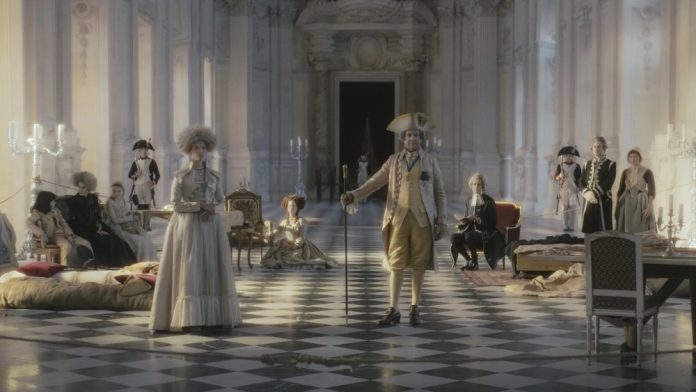The courtroom of Louis XVI is stripped to a light, festering husk of itself in “The Flood,” a stark examine of the king’s final days during which the luxurious trappings of French monarchy disappear earlier than our eyes — till solely its literal structure stays. An impressively extreme second characteristic by Italian director Gianluca Jodice, this can be a brisk rejoinder to previous cinematic portraits of Louis XVI and Marie Antoinette which have rendered even their downfall in probably the most lavish manner potential.
Such spectacle can have its personal ironic goal, as with the pointed whipped-cream extra of Sofia Coppola’s 2006 imaginative and prescient. However right here, as performed by Guillaume Canet and a blistering Mélanie Laurent, the deposed, imprisoned monarchs are mocked by no matter finery they’ve held onto: Trying shrunken and freeze-dried of their dirtied robes and more and more unkempt wigs, they’re useless nicely forward of their date with the guillotine. A fairly sober opener for this yr’s Locarno Movie Competition, “The Flood” could come as a disappointment to viewers preferring their royalty porn fairly and push, and never artfully painted in varied shades of dry rot. However there’s one thing quietly transfixing about its austerity, whereas the movie retains sufficient good-looking Euro-arthouse sheen — atop the draw of its title stars — to promote broadly.
Drawn from the diaries of Louis XVI’s private valet Jean-Baptiste Cléry (performed by Fabrizio Rongione), the movie begins within the speedy aftermath of the 1792 rebellion that noticed the Tuileries Palace stormed by armed revolutionaries, and the monarchy abolished. Arrested, the royal household and their retinue arrive on the Tour du Temple, a big however sparsely appointed chateau in central Paris, the place they’re to be confined whereas their destiny is set.
As prisons go, it’s soft by mere-mortal requirements: Within the single grand corridor the place they’re to collectively stay, rococo furnishings is haphazardly assembled in a crude diorama of their former lodgings, minus any separating partitions and doorways. To the queen, her face an more and more strained masks for her white-hot fury, they might as nicely have been forged into the wilderness. Always stressing the disparity in scale between aristocratically hovering ceilings and a dwindling flooring plan, Tonino Zera’s beautifully raveled manufacturing design contributes to the dystopian air of proceedings, as does Daniele Ciprī’s parched, desaturated lensing: The world might not be ending for the remainder of the nation, however with a stressed public calling for his or her heads, the royals could as nicely be barricaded towards a zombie apocalypse.
The script, by the director with Filippo Gravino, traces Louis and Marie Antoinette’s plummeting standing throughout three chapters. The primary, titled “The Gods,” sees the newly stripped royals nonetheless handled with an echo of the regard during which they have been held earlier than: Public prosecutor Manuel (Tom Hudson) addresses them with deferential respect, whilst he delivers lectures about democracy which can be so alien to the previous king as to be incomprehensible. (“What’s that?” he asks, sincerely flummoxed, when the phrase “equality” is spoken.) Candelit dinners are supplied, however with an early lights-out curfew. Such compromises, nevertheless, are a fond reminiscence within the movie’s second chapter, “The Males,” because the royal household’s allowances are additional curtailed, their aides are banished from the chateau, and their possibilities of leaving this Parisian purgatory alive look ever slimmer. The third, titled “The Lifeless,” wants no additional rationalization.
Whereas hardly a flattering portrait of those chilly, over-pampered elites (Canet’s Louis, particularly, is witless and ineffectual with out with energy), “The Flood” maintains a reasonably apolitical view on their crimes, their punishment, and the ratio of 1 to the opposite. The movie is extra within the private misery and intimate battle they endure as their lives are held in limbo, and whilst you may name it humanizing on this respect, it’s not warmly so. The loveless void of their marriage is harshly uncovered as increasingly individuals disappear from this parody of a palace — leaving Marie Antoinette prey to the sexual attentions of her newly dominant minders.
Laurent is extraordinary as a queen who stays stubbornly imperious even with nothing left to lord over, her make-up rising harsher and extra wraithlike as her robes flip to drooping mud ruffles. (Oscar-nominated costume designer Massimo Cantini Parrini will get the stability between splendor and squalor good on these palpably sweat-sour materials.) Her posture stiff and brittle, her neck wanting set to snap — with or with out the blade’s assist — beneath the load of synthetic hair and despair, she patrols her restricted area with a determined, virtually farcical form of satisfaction, till the pretense exhausts her, and she or he buckles into primal, animal screams. At her most susceptible level, she asks a guard how she may safe a standard chateau for herself by some means, and the way she may go about being a housewife — wanting, for all of the empty hope in her phrases, totally like she’d fairly die.































![[2409.12947] Unrolled denoising networks provably study optimum Bayesian inference](https://i0.wp.com/arxiv.org/static/browse/0.3.4/images/arxiv-logo-fb.png?w=218&resize=218,150&ssl=1)















